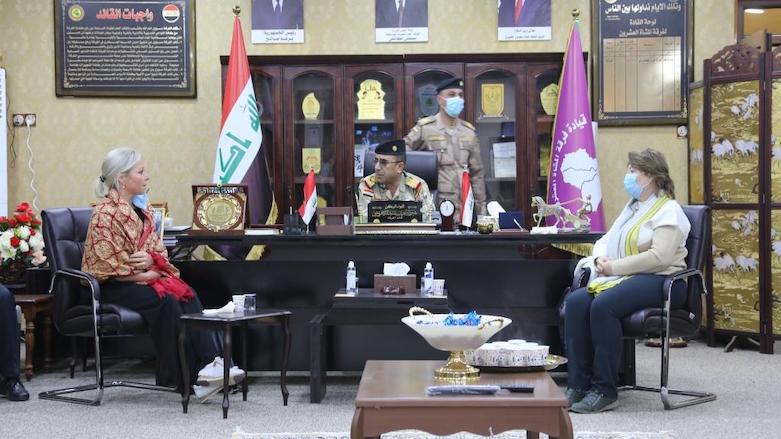UN envoy calls for faster implementation of Sinjar agreement
“The completion of the security arrangements and the implementation of other parts of the agreement need to be expedited so that critical reconstruction work and service delivery can kick-off and accelerate.”

ERBIL (Kurdistan 24) – United Nations envoy to Iraq Jeanine Hennis-Plasschaert has called for speedy implementation of an agreement reached between the Iraqi government and the Kurdistan Regional Government (KRG) on efforts to normalize conditions and alleviate the current hardships of the Yezidi people who live there.
Hennis-Plasschaert’s comments came following her visit to the Sinjar (Shingal) region. She was accompanied by her Deputy, Resident and Humanitarian Coordinator for Iraq, Irena Vojáčková-Sollorano.
“The completion of the security arrangements and the implementation of other parts of the agreement need to be expedited so that critical reconstruction work and service delivery can kick-off and accelerate,” a statement the UN Assistance Mission in Iraq (UNAMI) released quoted her as saying.
In October 2020, the Federal Government of Iraq and the Kurdistan Regional Government (KRG) announced they had reached an agreement, with support from the UN, to restore and normalize the situation in Shingal, where competing armed groups are active.
Read More: KRG and Baghdad reach administrative, security agreement on Sinjar
The plan involves understandings on security, civil administration, reconstruction, service rehabilitation, and the return of those displaced when the so-called Islamic State took over the area in 2014.
“Conditions on the ground must further improve to facilitate dignified, voluntary returns,” Hennis-Plasschaert said, according to UNAMI’s statement.
Sinjar, Iraq, 10 January 2021 – In a spirit of continued solidarity with the residents of Sinjar, the UNSRSG @JeanineHennis-Plasschaert visited the district today accompanied by her Deputy, Resident and Humanitarian Coordinator for Iraq @IrenaVSollorano . pic.twitter.com/R1DsAOtZGC
— UNAMI (@UNIraq) January 10, 2021
She also underlined that an “effective governance through a unified administration and stable security structures are the basis for any form of progress.”
“What has been achieved so far could set the stage for a greater improvement in living conditions, but to make this happen, all stakeholders will have to act in unity and solidarity.”
The Shingal field visit builds on an earlier meeting Hennis-Plasschaert held in November with the Governor of Nineveh and other components of Shingal in Mosul, where she urged both the Iraqi government and the KRG to implement the agreement.
Read More: UN envoy to Iraq calls for Sinjar agreement to be implemented
During Sunday’s visit, the UN delegation was briefed by the deputy governor of Nineveh, Hassan Thanon al-Ala’af; the commander of the Western Operations Command, Major General Jabbar Al-Ta’e; as well as the military and security commanders in charge of the district. They also heard from the local community and party leaders about their needs and concerns, the UNAMI statement said.
The delegation also visited Shingal’s Old City—devastated in the 2014 to 2017 conflict with the Islamic State—as well as the Al Banat village where around 600 displaced families from Shingal, mostly Yezidis, have returned to their places of origin.
Nadine Maenza, Commissioner of the official US Commission on International Religious Freedom (USCIRF), was encouraged to see the visit of the UN Special Representative to Shingal.
Encouraging to see UN Special Rep for #Iraq @JeanineHennis-Plasschaer visit #Sinjar & stress "the need to do more – in unity and at a faster pace - to alleviate the current hardships." With so little done to improve Sinjar after genocide in 2014, her urgency is welcomed! #Yazidi https://t.co/HXMAYOcGDz
— Nadine Maenza (@nadinemaenza) January 10, 2021
“The Yezidi community is in distress after six long years in refugee camps,” Maenza told Kurdistan 24. “According to recent reports, at least seven Yezidis have committed suicide since the new year—four Yezidi women between 15 to 25, and three Yezidi men younger than 25. It is time the international community works together to ensure they can return home.”
“It is hard to accept that hardly anything has improved in Sinjar since the genocide against them by ISIS in 2014,” she added. “It is frustrating that while 83 countries united as part of the Global Coalition to Defeat ISIS, so little has been done to help those same communities that were decimated by ISIS.”
“I used to think that security was the greatest threat to the Yezidi community in Sinjar, but really the main threat is indifference. Perhaps [Hennis-Plasschaert’s] visit and emphasis on urgency will help jump-start more activity to support Sinjar.”
Editing by Karzan Sulaivany